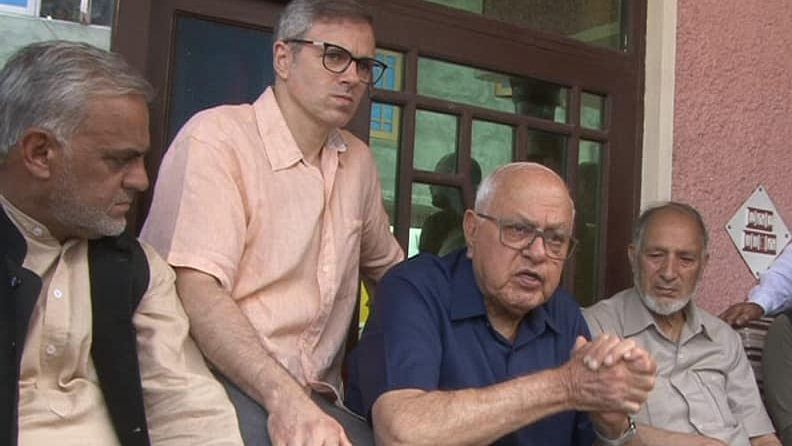Srinagar: Monday was the first time since 4 August, when Jammu & Kashmir was brought under a communication lockdown ahead of the revocation of Article 370, that the landline at the National Conference headquarters rang.
A party worker answered and the phone was handed to senior party leader and Baramulla MP Akbar Lone, one of a handful of National Conference members not under detention.
Two weeks after they were first imposed, restrictions that brought life to a standstill in J&K began to be eased over the weekend.
According to a report by news agency PTI, movement of people was eased and landline connections restored in some parts of the Valley.
Monday was also the first day journalists were allowed near the four-storey NC headquarters near Zero Bridge, where this reporter found a gloomy atmosphere as he ran into a handful of leaders and workers.
While NC chief Farooq Abdullah is reportedly under house arrest, his son and former chief minister Omar Abdullah is under arrest.
They are among more than 30 senior National Conference leaders under detention or arrest, most of them at the Sher-i-Kashmir International Convention Centre. The ones who are out are too scared to talk, fearing reprisal.
On Monday morning, more than six people were present at the headquarters, including two MPs, Lone and Anantnag representative Hasnain Masoodi.
Speaking to ThePrint, Lone described his time through the 15-day lockdown in J&K.
“We first tried to meet Dr Farooq Abdullah but weren’t allowed to do so. Then we took permission to meet my son Hilal Lone, who has been arrested and housed at the Sher-i-Kashmir International Convention Centre,” he added. “We managed to meet other NC leaders, including Ali Sagar, Mubarak Gul, Bashir Veeri.”
The corner office where Lone sat is located on the third floor of the building and is currently the only part of the headquarters that shows signs of life. Offices of all party-bearers, except that of the general secretary, who is in preventive custody, remain locked.
Also read: Kashmir an internal matter, India won’t acknowledge international pressure: J&K governor
‘An institution’
Built in the early 1980s, the Rajbagh office of the National Conference has been the epicentre of mainstream politics in Jammu & Kashmir. Earlier, the party operated out of Mujahid Manzil in downtown Srinagar, which was its first and main office but now has a largely symbolic role.
Over the past four decades, the Rajbagh office has been witness to some of the most turbulent periods in Kashmir’s history — the ouster of the Abdullah family from office, their return, the insurgency of 1989, the Kargil war, the civil unrest of 2008, 2009, 2010 and 2016.
For its workers, this is not a building but an institution, and a symbol of electoral and mainstream politics. This is perhaps why it is more difficult for them to comprehend the present situation and the grim future that they see ahead for the National Conference.
“This clampdown on Kashmir and on the NC is unprecedented, the last time we faced a similar situation was in 1984, when there was a Delhi-backed rebellion against the Abdullah family,” a veteran party worker told ThePrint.
He was referring to then chief minister Farooq Abdullah’s ouster by former Prime Minister Indira Gandhi over concerns that he wasn’t doing much to rein in extremists from Pakistan as well as Khalistanis (the latter were allegedly using Kashmir as a base).
“The loyalists of Sheikh sahab (Abdullah) went into hiding while rebel NC leaders, with the backing of the Indira Gandhi government, ruled these corridors,” the worker added. “Today, there is no one.”
Another party worker said: “The only people who come here are those looking for ways to get their loved ones released. We have nothing to offer, we are helpless.”
The weakening of the National Conference, a party that gave Jammu & Kashmir its first prime minister and multiple chief ministers, is a fact realised by its two MPs, the only senior leaders who are currently free. This makes them the most powerful in the party at the moment, but it’s a cross they don’t want to bear.
“Even the station house officers (SHOs) of Jammu & Kashmir Police have phones but we don’t. We are elected MPs for God’s sake, how are we supposed to reach out to our constituents?” said Masoodi. “Last week, there was a cloudburst in Pampore, so I told Mr Rohit Kansal, the government spokesperson, to look into the matter. I have no idea if he has done so,” he added.
“We tried to meet the governor and he did not give us an audience. Everything seems to be lost, what will we fight for now?”
Both Lone and Masoodi are unsure how mainstream politics will shape Kashmir in what has been described as a brutal assault.
“They have crossed all the limits this time. We had not even imagined that they would do so, but they have,” said Lone. “We dedicated our lives for India and today we are imprisoned. The trust that existed between Srinagar and New Delhi is broken forever.”
Most schools remain shut
The easing of restrictions in the Valley has evoked a rather lacklustre response, especially where schools are concerned. The administration announced the opening of 190 schools, but most institutions remained shut, including Tyndale Biscoe at Lal Chowk, Srinagar’s oldest and largest school.
ThePrint visited half a dozen schools in Srinagar, and found students had not turned up. A teacher at a school in Hyderpora said parents were not willing to drop their wards at school because there was no communication.
Communication lines remain snapped in major parts of Kashmir.
Also read: This is why Pakistan can no longer respond militarily to India’s Kashmir move
This report has been updated with additional information
